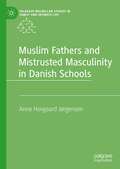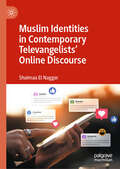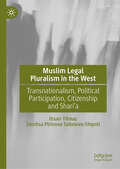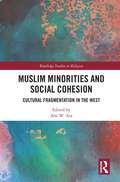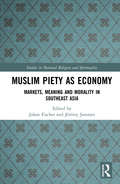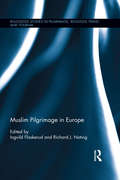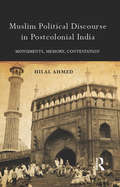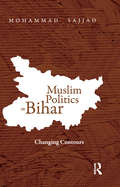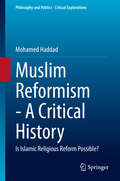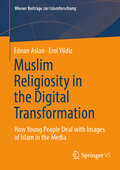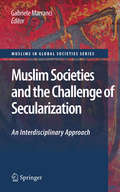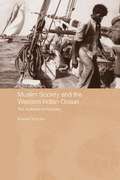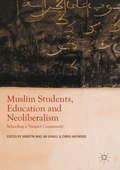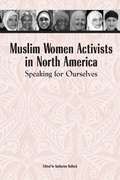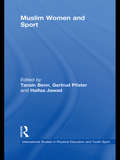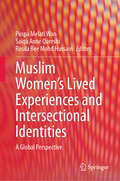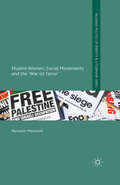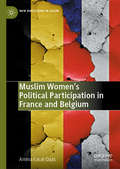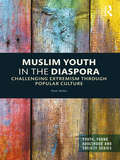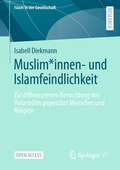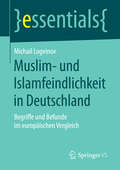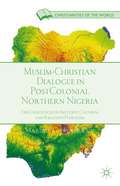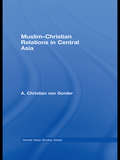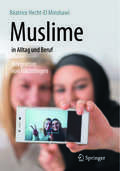- Table View
- List View
Muslim Fathers and Mistrusted Masculinity in Danish Schools (Palgrave Macmillan Studies in Family and Intimate Life)
by Anne Hovgaard JørgensenThis book seeks to provide a deeper understanding of Muslim migrant fathers’ experiences of home-school cooperation in Danish schools by identifying and contradicting a phenomenon of “mistrusted masculinity.” This term refers to a negative stereotype of Muslim migrant men that figures in political and media rhetoric where they are portrayed as controlling and patriarchal. Throughout the ethnography, migrant fathers confront this stereotype and express how they must navigate around this negative image in their struggle to be acknowledged as good fathers by their children’s schools. Jørgensen uses Geertzian “thick description” of micro-interaction between fathers and Danish teachers to explore the complex interplay of often-untested assumptions, misunderstandings, and untoward effects.
Muslim Identities in Contemporary Televangelists' Online Discourse
by Shaimaa El NaggarThis book examines the discourse of Muslim televangelism in the West, particularly looking at the emergence of 'home-grown' televangelists who grew up in the West and deliver their sermons in English, addressing audiences in contexts such as the UK and the USA. In their sermons, televangelists address topics that are relevant to the everyday life of Muslims and Muslim youth such as friendship, marriage and the misrepresentation of Islam/Muslims in mass media. This book explores contemporary Muslim televangelism and its manifestations in other forms of digital religion, including YouTube, websites and social media which mediate religious content. Using a Critical Discourse Studies approach, the author explores the power structures underpinning the popularity of Muslim televangelism, investigates the linguistic strategies used by Muslim televangelists to construct their identities online, and analyses how Islam and Muslims are represented in their sermons. This book will be of interest to religious studies, media studies, and discourse studies scholars, and to anyone interested in the topic of Islam/Muslims in the West in the contemporary age.
Muslim Legal Pluralism in the West: Transnationalism, Political Participation, Citizenship and Shari’a
by Ihsan Yilmaz Denitsa Pirinova Sokolova-ShipoliThis book is a comprehensive introductory text to the subject of Western Muslims’ diverse interpretations, discussions and practices of Shari’a with a particular focus on their daily lives in the West. Through a series of interconnected chapters, the book navigates key themes such as Shari’a and legal pluralism, Shari’a vis-à-vis the experiences and political participation of Muslims in Western democracies, the role of religious scholars, the dynamics of Shari’a courts, Shari’a and multiple belongings, and transnational loyalties. Functioning as a comprehensive reader and handbook, the book offers non-experts a comprehensive understanding of the meaning and relevance of Shari’a in Western contexts, exploring how Muslims interpret and apply its principles in their lived experiences and challenging the one-dimensional narratives.
Muslim Minorities and Social Cohesion: Cultural Fragmentation in the West (Routledge Studies in Religion)
by Abe W. AtaThis book examines various attempts in the ‘West’ to manage cultural, linguistic, and religious diversity – focusing on Muslim minorities in predominantly non-Muslim societies. An international panel of contributors chart evolving national identities and social values, assessing the way that both contemporary ‘Western’ societies and contemporary Muslim minorities view themselves and respond to the challenges of diversity. Drawing on themes and priority subjects from Islamic Culture within Euro-Asian, Australian, and American international research, they address multiple critical issues and discuss their implications for existing and future policy and practice in this area. These include subjects such as gender, the media, citizenship, and multiculturalism. The insight provided by this wide-ranging book will be of great use to scholars of Religious Studies, Interreligious Dialogue and Islamic Studies, as well as Politics, Culture, and Migration.
Muslim Piety as Economy: Markets, Meaning and Morality in Southeast Asia (Studies in Material Religion and Spirituality)
by Johan Fischer Jérémy JammesThe first volume to explore Muslim piety as a form of economy, this book examines specific forms of production, trade, regulation, consumption, entrepreneurship and science that condition – and are themselves conditioned by – Islamic values, logics and politics. With a focus on Southeast Asia as a site of significant and diverse integration of Islam and the economy – as well as the incompatibilities that can occur between the two – it reveals the production of a Muslim piety as an economy in its own right. Interdisciplinary in nature and based on in-depth empirical studies, the book considers issues such as the Qur’anic prohibition of corruption and anti-corruption reforms; the emergence of the Islamic economy under colonialism; ‘halal’ or ‘lawful’ production, trade, regulation and consumption; modesty in Islamic fashion marketing communications; and financialisation, consumerism and housing. As such, it will appeal to scholars of sociology, anthropology and religious studies with interests in Islam and Southeast Asia.
Muslim Pilgrimage in Europe (Routledge Studies in Pilgrimage, Religious Travel and Tourism)
by Ingvild Flaskerud Richard J. NatvigIn spite of Islam’s long history in Europe and the growing number of Muslims resident in Europe, little research exists on Muslim pilgrimage in Europe. This collection of eleven chapters is the first systematic attempt to fill this lacuna in an emerging research field. Placing the pilgrims’ practices and experiences centre stage, scholars from history, anthropology, religious studies, sociology, and art history examine historical and contemporary hajj and non-hajj pilgrimage to sites outside and within Europe. Sources include online travelogues, ethnographic data, biographic information, and material and performative culture. The interlocutors are European-born Muslims, converts to Islam, and Muslim migrants to Europe, in addition to people who identify themselves with other faiths. Most interlocutors reside in Albania, Bosnia-Hercegovina, Italy, France, the Netherlands, Great Britain, and Norway. This book identifies four courses of developments: Muslims resident in Europe continue to travel to Mecca and Medina, and to visit shrine sites located elsewhere in the Middle East and North Africa. Secondly, there is a revival of pilgrimage to old pilgrimage sites in South-eastern Europe. Thirdly, new Muslim pilgrimage sites and practices are being established in Western Europe. Fourthly, Muslims visit long-established Christian pilgrimage sites in Europe. These practices point to processes of continuity, revitalization, and innovation in the practice of Muslim pilgrimage in Europe. Linked to changing sectarian, political, and economic circumstances, pilgrimage sites are dynamic places of intra-religious as well as inter-religious conflict and collaboration, while pilgrimage experiences in multiple ways also transform the individual and affect the home-community.
Muslim Political Discourse in Postcolonial India: Monuments, Memory, Contestation
by Hilal AhmedThe book examines the postcolonial Muslim political discourse through monuments. It establishes a link between the process by which historic buildings become monuments and the gradual transformation of these historic/legal entities into political objects. The author studies the multiple interpretations of Indo-Islamic historical buildings as ‘political sites’ as well as emerging Muslim religiosities and the internal configurations of Muslim politics in India. He also looks at the modes by which a memory of a royal Muslim past is articulated for political mobilisation. Raising critical questions such as whether Muslim responses to political questions are homogenous, the book will greatly interest researchers and students of political science, modern Indian history, sociology, as well as the general reader interested in contemporary India.
Muslim Politics in Bihar: Changing Contours
by Mohammad SajjadThis book studies the engagement of various Muslim communities with Bihar politics from colonial times to present-day India. It debunks several myths in highlighting Muslim resistance to the Two-Nation theory, and counters the ‘Isolation Syndrome’ faced by Muslim communities after Independence. Using rare archival sources and hitherto unexamined Urdu texts, this book offers a nuanced exploration of complex themes such as the struggle against Bengali hegemony, communalism, regionalism and alienation before Independence, recent language politics, the political assertion of low-caste Muslims in current Bihar, as well as their quest for social and gender justice. An important contribution to the study of South Asian Islam, this book will interest students and scholars of modern Indian history, politics, sociology, religion, gender, and minority studies.
Muslim Reformism - A Critical History: Is Islamic Religious Reform Possible? (Philosophy and Politics - Critical Explorations #11)
by Mohamed HaddadThis book examines the evolution of Islam in our modern world. The renowned Tunisian scholar Mohamed Haddad traces the history of the reformist movement and explains recent events related to the Islamic religion in Muslim countries and among Muslim minorities across the world. In scholarly terms, he evaluates the benefits and drawbacks of theological-political renovation, neo-reformism, legal reformism, mystical reformism, radical criticism, comprehensive history and new approaches within the study of Islam. The book brings to life the various historical, sociological, political and theological challenges and debates that have divided Muslims since the 19th century. The first two chapters address failed reforms in the past and introduce the reader to classical reformism and to Mohammed Abduh. Haddad ultimately proposes a non-confessional definition of religious reform, reinterpreting and adjusting a religious tradition to modern requirements. The second part of the book explores perspectives on contemporary Islam, the legacy of classical reformism and new paths forward. It suggests that the fundamentalism embodied in Wahhabism and Muslim Brotherhood has failed. Traditional Islam no longer attracts either youth or the elites. Mohamed Haddad shows how this paves the way for a new reformist departure that synthesizes modernism and core Islamic values.
Muslim Religiosity in the Digital Transformation: How young people deal with images of Islam in the media (Wiener Beiträge zur Islamforschung)
by Erol Yildiz Ednan AslanThe effects of social media can be observed particularly in relation to the religious commitment and religious practices of young people - who today are summarized under terms such as "internet generation", "media generation" or "digital natives". Online media exert a major influence on their lives, their understanding of the world, their religious orientations and actions. Their identity constructions, their cultural and religious orientations are closely intertwined with social media. This is precisely where the present study started with the question of what subjective consequences interaction on the social web has for the religious orientations, practices and self-conceptions of Muslim young people in Austria. The focus was on the connections between media use, media images of Islam and lived religiosity. On the one hand, the results show that the use of social media creates objective spaces of opportunity that can go hand in hand with an expansion of individual scope for action, whereby religious authority is increasingly being questioned. On the other hand, the study also shows that the use of digital media can also lead to a narrowing of individual religious orientations.
Muslim Societies and the Challenge of Secularization: An Interdisciplinary Approach
by Gabriele MarranciScholars from various disciplines worked together to present the first interdisciplinary book to address the issue of Islam, secularism and globalization. The book has a clear structure which represents its interdisciplinary approach: the first section addresses the philosophical and historical discussion about Islam and secularism; the second section discusses the topic from an ethnographical and social anthropological viewpoint; and the final section addresses Islam, secularism and globalization from a political viewpoint. This unique collection not only offers innovative research and new material, it also provides empirical examples and theoretical debates, and could therefore also be used as a textbook for courses on Islam, globalization, anthropology, politics, sociology and law.
Muslim Society and the Western Indian Ocean: The Seafarers of Kachchh (Routledge Indian Ocean Series)
by Edward SimpsonBased on substantial ethnographic, textual and archival research, this interesting book offers a new perspective on the anthropology of the western Indian Ocean. Writing in a clear, engaging style, and covering an impressive range of theoretical terrain, Simpson critically explores the relationships between people and things that give life to the region and drive shifting patterns of social change among Muslims in the highly-politicized state of Gujarat. Scholars of the Indian Ocean, Muslim society in South Asia, and Hindu nationalism, as well as anthropologists in general, will find this a fascinating read and a major contribution to research in this area.
Muslim Students, Education and Neoliberalism
by Chris Haywood Máirtín Mac an GhaillThis edited collection brings together international leading scholars to explore why the education of Muslim students is globally associated with radicalisation, extremism and securitisation. The chapters address a wide range of topics, including neoliberal education policy and globalization; faith-based communities and Islamophobia; social mobility and inequality; securitisation and counter terrorism; and shifting youth representations. Educational sectors from a wide range of national settings are discussed, including the US, China, Turkey, Canada, Germany and the UK; this international focus enables comparative insights into emerging identities and subjectivities among young Muslim men and women across different educational institutions, and introduces the reader to the global diversity of a new generation of Muslim students who are creatively engaging with a rapidly changing twenty-first century education system. The book will appeal to those with an interest in race/ethnicity, Islamophobia, faith and multiculturalism, identity, and broader questions of education and social and global change.
Muslim Volunteering in the West: Between Islamic Ethos and Citizenship (New Directions in Islam)
by Mario Peucker Merve Reyhan KayikciThis edited volume explores various facets of Muslims’ civic engagement in Western post-secular societies, fundamentally challenging simplistic boundaries between Islamic ethical conduct and liberal-democratic norms and practice.Bringing together scholars from sociology, anthropology, and Islamic theology, the collection offers sound theoretical and empirical elaborations on the complex ways in which Islamic piety, principles and norms interact with, and shape, Muslims’ everyday practice of volunteering as a performance of active citizenship in liberal societies. The contributions cover diverse manifestations of Muslim volunteering in North America, Europe and Australia, from environmentalism to mental health volunteering, and critically examine the national and global socio-political context within which certain forms of Muslims’ civic engagement are viewed with skepticism and suspicion. It will be of use to students and scholars across sociology, political science, community studies and Islamic studies, with a focus on migrant integration, diaspora studies, and inter-ethnic relations.
Muslim Women Activists in North America: Speaking for Ourselves
by Katherine BullockIn the eyes of many Westerners, Muslim women are hidden behind a veil of negative stereotypes that portray them as either oppressed, subservient wives and daughters or, more recently, as potential terrorists. <P><P>Yet many Muslim women defy these stereotypes by taking active roles in their families and communities and working to create a more just society. This book introduces eighteen Muslim women activists from the United States and Canada who have worked in fields from social services, to marital counseling, to political advocacy in order to further social justice within the Muslim community and in the greater North American society.
Muslim Women and Sport (Routledge Studies in Physical Education and Youth Sport)
by Tansin BennExamining the global experiences, challenges and achievements of Muslim women participating in physical activities and sport, this important new study makes a profound contribution to our understanding of both contemporary Islam and the complexity and diversity of women’s lives in the modern world. The book presents an overview of current research into constructs of gender, the role of religion and the importance of situation, and looks closely at what Islam has to say about women’s participation in sport and what Muslim women themselves have to say about their participation in sport. It highlights the challenges and opportunities for women in sport in both Muslim and non-Muslim countries, utilizing a series of extensive case-studies in various countries which invite the readers to conduct cross-cultural comparisons. Material on Iraq, Palestine and Bosnia and Herzegovina provides rare insights into the impact of war on sporting activities for women. The book also seeks to make important recommendations for improving access to sport for girls and women from Muslim communities. Muslim Women and Sport confronts many deeply held stereotypes and crosses those commonly quoted boundaries between ‘Islam and the West’ and between ‘East and West’. It makes fascinating reading for anyone with an interest in the interrelationships between sport, religion, gender, culture and policy.
Muslim Women's Lived Experiences and Intersectional Identities: A Global Perspective
by Puspa Melati Wan Saiqa Anne Qureshi Rosila Bee Mohd HussainThis volume takes a global perspective on intersectionality embodied by Muslim women. It addresses questions such as balancing multiple identities, lived experiences and complex realities, and the role of faith in social roles. The chapters debunk the idea of Islam or gender being monoliths. They layer faith over gender across the globe and consider migration as an important factor, thereby exploring intersectional identities that are understudied and under-evaluated. The volume overall brings to life Islamic women's lives in all their richness and differences, with discussions on social roles, positions, initiatives, and occupations across regions. It provides recommendations and suggestions for readers to understand the complex realities of Muslim women as well as serves as a guide for practitioners and policy-makers.
Muslim Women, Social Movements and the 'War on Terror' (Palgrave Politics of Identity and Citizenship Series)
by Narzanin MassoumiOn 15th February 2003, two million people marched in the streets of London to call on the British government not to go to war with Iraq. Though Britain did enter war, the movement did not rest in defeat. This book tells the story of what happened behind the scenes of this extraordinary mass movement, looking specifically at the political relationship between Muslim and leftist activists.Crisis narratives about Muslims assume that they are only engaged with sectarian communalist forms of identity politics or that their supposed religious and social conservatism is incompatible with progressive values. Through telling this story, Massoumi looks closely at the role of identity politics within social movements, considering what this means in practice and whether we can meaningfully speak of identity politics. Arguing that identity politics can only be understood within the context of a wider social and political structure, this book analyses the conditions through which Muslim and leftist engagement emerges within this movement, and highlights the decisive leadership of Muslim women.
Muslim Women’s Political Participation in France and Belgium (New Directions in Islam)
by Amina Easat-DaasThis book outlines the principal motivations, opportunities and barriers to Muslim women’s political participation in France and francophone Belgium. Easat-Daas draws on in-depth comparative contextual analysis along with semi-structured interview material with women from France and Belgium who self-identify as Muslim and are active in a variety of modes of political participation, such European Parliamentarians, Senators, councilwomen, trade-union activists and those engaged in grass-roots political movements. This provides an alternative framing of Muslim women, removed from the tired and often exaggerated stereotypes that portray them as passive objects or sources of threat, instead highlighting their remarkable resilience and consistent determination. Through exploring the intersecting fault lines of racial, Islamophobic and gendered struggles of Muslim women in these two cases, this book also sheds new light on the role of ‘European Islam’, political opportunity structures, secularism and Muslim women’s dress.
Muslim Youth in the Diaspora: Challenging Extremism through Popular Culture (Youth, Young Adulthood and Society)
by Pam NilanIn a world where the term Islam is ever-increasingly an inaccurate and insensitive synonym for terrorism, it is unsurprising that many Muslim youth in the West struggle for a viable sense of identity. This book takes up the hotly-debated issue of Muslim youth identity in western countries from the standpoint of popular culture. It proposes that in the context of Islamophobia and pervasive moral panic, young Muslims frame up their identity in relation to external conditions that only see ‘good’ and ‘bad’ Muslims, on both sides of the ideological fence between Islam and the West. Indeed, by attempting to break down the ‘good’ versus ‘bad’ Muslim dichotomy that largely derives from western media reports, as well as political commentary, Muslim Youth in the Diaspora: Challenging Extremism through Popular Culture will enlighten the reader. It illuminates the way in which diasporic Muslim youth engage with, and are affected by, the radical Islamist meta-narrative. It examines their popular culture and online activity, their gendered sense of self, and much more. This original book will be of interest to students and scholars interested in the fields of sociology, cultural studies and social anthropology. It offers a particular focus on Islam for research in youth studies, youth culture, political radicalisation and religious identity. It will also be relevant to the sector of youth and social work, where practitioners seek to build cultural bridges with a new generation.
Muslim*innen- und Islamfeindlichkeit: Zur differenzierten Betrachtung von Vorurteilen gegenüber Menschen und Religion (Islam in der Gesellschaft)
by Isabell DiekmannDieses Open-Access-Buch zeigt, dass feindliche Einstellungen gegenüber Muslim*innen oder als Muslim*innen markierten Menschen und gegenüber der Religion des Islams oftmals nur wenig differenziert betrachtet werden. Die mangelnde Trennschärfe zwischen Einstellungen gegenüber Menschen auf der einen und einer Religion auf der anderen Seite manifestiert sich etwa in Definitionen, in denen Islam und Muslim*innen in scheinbar untrennbarer Art und Weise zueinander konstruiert werden oder im Operationalisierungsprozess, wenn auf manifester Ebene Einstellungen gegenüber Muslim*innen erhoben werden, das Konstrukt jedoch als Islamfeindlichkeit bezeichnet wird. Diese Studie untersucht, (1) ob eine synonyme Verwendung der Begriffe gerechtfertigt ist oder ob sich empirisch nachweisen lässt, dass Islam- und Muslim*innenfeindlichkeit nicht identisch sind, (2) inwiefern Unterschiede im Ausmaß feindlicher Einstellungen gegenüber dem Islam und gegenüber Muslim*innen bestehen und (3) wie sich Deutungsrahmen der Befragten mit den Begriffen 'Islam' und 'Muslim*innen' voneinander unterscheiden. Die Zerlegung in seine Einzelteile ermöglicht es, das Phänomen in all seinen Dimensionen zu verstehen und wichtige theoretisch-konzeptionelle, methodologische und handlungspraktische Konsequenzen abzuleiten.
Muslim- und Islamfeindlichkeit in Deutschland: Begriffe und Befunde im europäischen Vergleich (essentials)
by Michail LogvinovMichail Logvinov geht in diesem essential der Frage nach, ob die in den deutschen Meinungsumfragen gemessene Islamfeindlichkeit bzw. Islamophobie eine spezifische Auspr#65533;gung hat. Er schl#65533;gt konsensf#65533;hige Begriffsbestimmungen vor, erarbeitet die Kriterien, an denen die Islam- und Muslimfeindlichkeit in Deutschland festgemacht werden k#65533;nnen, und geht auf deren historische und soziale Ursachen ein. Die Frage, was bei Islamfeindlichkeit eigentlich gemessen wird und ob es in Deutschland ein besonderes ,,Feindbild Islam" gibt, ist gerade in Zeiten der ,,Pegida" und neuen extremistischen Formationen wie den ,,Pro-Bewegungen" relevant. Setzt sich doch die (verstehende) Sozialwissenschaft zum Ziel, Aussagen #65533;ber die Qualit#65533;t sozialer Konflikte treffen und L#65533;sungsvorschl#65533;ge anbieten zu k#65533;nnen.
Muslim-Christian Dialogue in Postcolonial Northern Nigeria: The Challenges of Inclusive Cultural and Religious Pluralism (Christianities of the World)
by Marinus C. IwuchukwuIwuchukwu examines the perennial conflicts in different parts of northern Nigeria and why they are popularly called Muslim-Christian clashes. Specifically, he examines the immediate and remote factors that are responsible for the conflicts.
Muslim-Christian Relations in Central Asia (Central Asian Studies)
by Christian van GorderThis book explores issues of cultural tension that affect Muslim and Christian interaction within the Central Asian context. It looks at the ways that Christians have interacted with Central Asian Muslims in the past, and discusses what might need to be done to improve Muslim-Christian relations in the region in the present and future. Since the time that Nestorian Christian missionaries traveled eastward from Asia Minor along the Silk Road, and Islamic cultures came to the region in the 7th century, Christians and Muslims have shared a unique relationship in a fascinating cultural milieu. Under the reigns of various conquerors, Czars, Soviets and modern nationalist strong-men, the ever changing political and economic situation of these former Soviet Republics has dramatically affected the ways that Muslims and Christians have practiced their faith. Today, as Muslims and Christians work to stabilize their interactions, they face new challenges because of the activities of Protestant Christian and Islamist missionaries who are flooding into Central Asia as never before. The book corrects common misunderstandings of Central Asia as a cultural backwater, and is a valuable introduction to Muslim and Christian interactions in one of the most quickly changing regions of the globe. It will appeal to readers interested in Muslim-Christian interaction, and for researchers in the field of World Religions, Central Asian Studies and Intercultural Studies.
Muslime in Alltag und Beruf: Integration von Flüchtlingen
by Béatrice Hecht-El MinshawiIn diesem Buch erfahren alle, die Flüchtlingen und Asylbewerbern begegnen – privat wie beruflich –, wie sie zu einem guten Miteinander beitragen können. In Deutschland gibt es viele Neubürger und Migranten: Exilanten, Flüchtlinge und Asylbewerber. Ein Großteil kommt aus islamischen Gesellschaften und ist mit manchen anderen Normen und Werten aufgewachsen. Deshalb ist davon auszugehen, dass wir immer öfter Muslimen in Beruf und Alltag begegnen. Sie gehören zu uns. Damit das Zusammenleben und die Zusammenarbeit gelingt, ist ein fundiertes interkulturelles Wissen notwendig: kulturelle Gemeinsamkeiten und Unterschiede, Mentalitäten, Verhaltensregeln, Kommunikationsstrategien und Tabus. Dieses Praxisbuch hilft, Muslime zu verstehen und vermittelt Ideen zum gemeinsamen Handeln – mit zahlreichen Fallbeispielen und Checklisten. Es richtet sich als Beratungsbuch und Arbeitsgrundlage an alle Personen im deutschsprachigen Raum, die mit Muslimen zu tun haben, in privaten und öffentlichen Einrichtungen wie Behörden und Schulen und in Betrieben.
